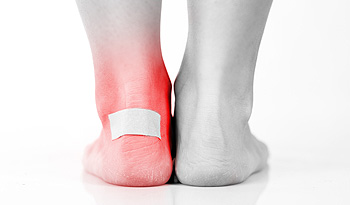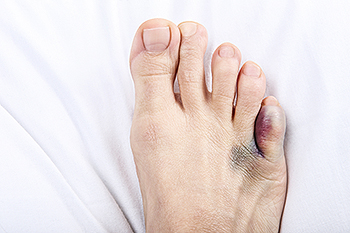Blog - Foot Doctor, Chambersburg and McConnellsburg, PA
Mystery Blisters on the Feet
You are going about your day, when suddenly you feel a pain in your foot. You look down and are surprised to find a blister. You don’t remember wearing tight shoes or exercising all day, so what could have caused this blister? While it’s true that most blisters are the result of friction, usually from shoes or socks rubbing repeatedly over a small area of skin during physical activity, there are other reasons that you may have developed a blister. These can include excessive moisture on the skin, sunburns, an allergic reaction, psoriasis, eczema, athlete’s foot, and even insect bites. If you have painful, unexplained blisters on your feet, it is strongly suggested that you seek the care of a podiatrist. This specialist can determine what caused the blisters and advise you on what you should do to treat them. For more information about treating and preventing foot blisters, please consult with a podiatrist.
Blisters may appear as a single bubble or in a cluster. They can cause a lot of pain and may be filled with pus, blood, or watery serum. If your feet are hurting, contact Dr. Steven Schwartz of Pennsylvania. Our doctor can provide the care you need to keep you pain-free and on your feet.
Foot Blisters
Foot blisters are often the result of friction. This happens due to the constant rubbing from shoes, which can lead to pain.
What Are Foot Blisters?
A foot blister is a small fluid-filled pocket that forms on the upper-most layer of the skin. Blisters are filled with clear fluid and can lead to blood drainage or pus if the area becomes infected.
Symptoms
(Blister symptoms may vary depending on what is causing them)
- Bubble of skin filled with fluid
- Redness
- Moderate to severe pain
- Itching
Prevention & Treatment
In order to prevent blisters, you should be sure to wear comfortable shoes with socks that cushion your feet and absorb sweat. Breaking a blister open may increase your chances of developing an infection. However, if your blister breaks, you should wash the area with soap and water immediately and then apply a bandage to the affected area. If your blisters cause severe pain it is important that you call your podiatrist right away.
If you have any questions, please feel free to contact our offices located in Chambersburg, and Mcconnellsburg, PA . We offer the newest diagnostic and treatment technologies for all your foot care needs.
Making Sense of Pinky Toe Pain
Discovering the cause of pinky toe pain can be challenging. Its strategic placement on the outside of the foot helps the pinky toe work in tandem with the heel and big toe to balance the body during movement. However, this very location and its petite size make the pinky toe more susceptible to injury. For instance, stubbing, or dropping something heavy on it can cause one or more of its three bones to break. Stress, or hairline, fractures may also occur from repeated motions and activities such as running and jumping. One of its bones may separate from the others, causing dislocation (complete separation), or subluxation (partial separation). If ligaments become damaged, this can result in a sprain. Other conditions that may cause pinky toe pain include tailor’s bunions (a bunionette that forms on the outside of the pinky toe), or deformities such as hammer toe, claw toe, or overlapping pinky toe. Any chronic pain, swelling, or malformation in your pinky toe should be diagnosed by a podiatrist, followed by an appropriate course of treatment.
Foot Pain
Foot pain can be extremely painful and debilitating. If you have a foot pain, consult with Dr. Steven Schwartz from Pennsylvania. Our doctor will assess your condition and provide you with quality foot and ankle treatment.
Causes
Foot pain is a very broad condition that could be caused by one or more ailments. The most common include:
- Bunions
- Hammertoes
- Plantar Fasciitis
- Bone Spurs
- Corns
- Tarsal Tunnel Syndrome
- Ingrown Toenails
- Arthritis (such as Gout, Rheumatoid, and Osteoarthritis)
- Flat Feet
- Injury (from stress fractures, broken toe, foot, ankle, Achilles tendon ruptures, and sprains)
- And more
Diagnosis
To figure out the cause of foot pain, podiatrists utilize several different methods. This can range from simple visual inspections and sensation tests to X-rays and MRI scans. Prior medical history, family medical history, and any recent physical traumatic events will all be taken into consideration for a proper diagnosis.
Treatment
Treatment depends upon the cause of the foot pain. Whether it is resting, staying off the foot, or having surgery; podiatrists have a number of treatment options available for foot pain.
If you have any questions, please feel free to contact our offices located in Chambersburg, and Mcconnellsburg, PA . We offer the newest diagnostic and treatment technologies for all your foot care needs.
What Can Cause Flat Feet?
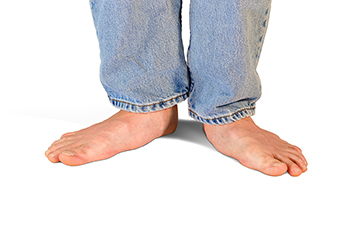 Flat feet are generally easy to notice because the foot lacks an arch. It can develop due to genetics, or if the posterior tibial tendon has become injured. This tendon is responsible for connecting the calf muscles to the inside of the ankle, and it helps to provide the necessary support to the foot. Pain in the foot may be the result of flat feet, and the foot may become easily tired. After a proper diagnosis is made, effective treatment methods can be determined. Some patients have found relief when custom-made orthotics are worn, and this may help to provide the necessary support as daily activities are accomplished. If you have flat feet, it is suggested that you be under the care of a podiatrist who can properly monitor this condition.
Flat feet are generally easy to notice because the foot lacks an arch. It can develop due to genetics, or if the posterior tibial tendon has become injured. This tendon is responsible for connecting the calf muscles to the inside of the ankle, and it helps to provide the necessary support to the foot. Pain in the foot may be the result of flat feet, and the foot may become easily tired. After a proper diagnosis is made, effective treatment methods can be determined. Some patients have found relief when custom-made orthotics are worn, and this may help to provide the necessary support as daily activities are accomplished. If you have flat feet, it is suggested that you be under the care of a podiatrist who can properly monitor this condition.
Flatfoot is a condition many people suffer from. If you have flat feet, contact Dr. Steven Schwartz from Pennsylvania. Our doctor will treat your foot and ankle needs.
What Are Flat Feet?
Flatfoot is a condition in which the arch of the foot is depressed and the sole of the foot is almost completely in contact with the ground. About 20-30% of the population generally has flat feet because their arches never formed during growth.
Conditions & Problems:
Having flat feet makes it difficult to run or walk because of the stress placed on the ankles.
Alignment – The general alignment of your legs can be disrupted, because the ankles move inward which can cause major discomfort.
Knees – If you have complications with your knees, flat feet can be a contributor to arthritis in that area.
Symptoms
- Pain around the heel or arch area
- Trouble standing on the tip toe
- Swelling around the inside of the ankle
- Flat look to one or both feet
- Having your shoes feel uneven when worn
Treatment
If you are experiencing pain and stress on the foot you may weaken the posterior tibial tendon, which runs around the inside of the ankle.
If you have any questions please feel free to contact our offices located in Chambersburg, and Mcconnellsburg, PA . We offer the newest diagnostic and treatment technologies for all your foot and ankle needs.
Posterior Tibial Tendonitis and Foot Pain
Posterior tibial tendonitis is a common cause of foot pain and is characterized by inflammation, degeneration, or tearing of the tibialis posterior tendon, located along the inside of the ankle. This tendon is responsible for stabilizing the lower leg and supporting the arch of the foot. When it is injured, you may experience pain, swelling, stiffness, reduced mobility, and fallen arches. Left untreated, this condition can progress from minor tendon damage to partial or complete rupture of the tendon. Potential treatments may include resting, icing, compressing, and elevating the affected foot, taking anti-inflammatory medications, wearing orthotics or more supportive shoes, and doing ankle strengthening exercises. In more severe cases, the ankle may need to be immobilized with a cast or boot for a period of time. If you are dealing with any foot or ankle pain, please seek the care of a podiatrist.
Ankle and foot injuries are common among athletes and in many sports. They can be caused by several problems and may be potentially serious. If you are feeling pain or think you were injured in a sporting event or when exercising, consult with Dr. Steven Schwartz from Pennsylvania. Our doctor will assess your condition and provide you with quality foot and ankle treatment.
Common Injuries
The most common injuries that occur in sporting activities include:
- Achilles Tendonitis
- Achilles Tendon Rupture
- Ankle Sprains
- Broken Foot
- Plantar Fasciitis
- Stress Fractures
- Turf Toe
Symptoms
Symptoms vary depending upon the injury and in some cases, there may be no symptoms at all. However, in most cases, some form of symptom is experienced. Pain, aching, burning, bruising, tenderness, tightness or stiffness, sensation loss, difficulty moving, and swelling are the most common symptoms.
Treatment
Just as symptoms vary depending upon the injury, so do treatment options. A common treatment method is known as the RICE method. This method involves rest, applying ice, compression and elevating the afflicted foot or ankle. If the injury appears to be more serious, surgery might be required, such as arthroscopic or reconstructive surgery. Lastly, rehabilitation or therapy might be needed to gain full functionality in the afflicted area. Any discomfort experienced by an athlete must be evaluated by a licensed, reputable medical professional.
If you have any questions, please feel free to contact our offices located in Chambersburg, and Mcconnellsburg, PA . We offer the newest diagnostic and treatment technologies for all your foot care needs.
Treating Plantar Fasciitis
The connective tissue on the foot’s sole (plantar)—which connects the heel to the toes and helps create the arch—is known as the plantar fascia. When the plantar fascia becomes inflamed due to obesity, overuse, prolonged standing for work, running on hard surfaces, changes in footwear, or high or fallen arches, it can become inflamed and this is known as plantar fasciitis. Since plantar fasciitis is one of the leading causes of heel pain, podiatrists have developed many non-invasive, as well as conservative methods of treatment for this condition, including FDA-approved Extracorporeal ShockWave Therapy (ESWT). In severe cases, a surgical solution may provide the best outcome. If you are experiencing heel pain contact a podiatrist for a full examination, diagnosis, and professional care.
Plantar fasciitis is a common foot condition that is often caused by a strain injury. If you are experiencing heel pain or symptoms of plantar fasciitis, contact Dr. Steven Schwartz from Pennsylvania. Our doctor can provide the care you need to keep you pain-free and on your feet.
What Is Plantar Fasciitis?
Plantar fasciitis is one of the most common causes of heel pain. The plantar fascia is a ligament that connects your heel to the front of your foot. When this ligament becomes inflamed, plantar fasciitis is the result. If you have plantar fasciitis you will have a stabbing pain that usually occurs with your first steps in the morning. As the day progresses and you walk around more, this pain will start to disappear, but it will return after long periods of standing or sitting.
What Causes Plantar Fasciitis?
- Excessive running
- Having high arches in your feet
- Other foot issues such as flat feet
- Pregnancy (due to the sudden weight gain)
- Being on your feet very often
There are some risk factors that may make you more likely to develop plantar fasciitis compared to others. The condition most commonly affects adults between the ages of 40 and 60. It also tends to affect people who are obese because the extra pounds result in extra stress being placed on the plantar fascia.
Prevention
- Take good care of your feet – Wear shoes that have good arch support and heel cushioning.
- Maintain a healthy weight
- If you are a runner, alternate running with other sports that won’t cause heel pain
There are a variety of treatment options available for plantar fasciitis along with the pain that accompanies it. Additionally, physical therapy is a very important component in the treatment process. It is important that you meet with your podiatrist to determine which treatment option is best for you.
If you have any questions, please feel free to contact our offices located in Chambersburg, and Mcconnellsburg, PA . We offer the newest diagnostic and treatment technologies for all your foot care needs.
What to Do to Avoid Running Injuries
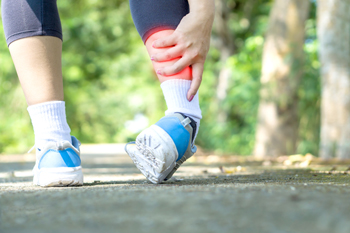 If you are a runner, then you are likely familiar with the multitude of injuries that runners may incur. These can include muscle strains, ankle sprains, plantar fasciitis, Achilles tendon injuries, foot or ankle fractures, as well as many others. It is important to take steps to prevent running injuries. While running, make sure that you are wearing comfortable, properly-fitted shoes that are appropriate for your gait and the type of running that you do. Replace your running shoes if they become worn out or damaged. Prior to running, warm up with a jog. Strength training and stretching can help maintain the strength and flexibility of your lower limbs, reducing the risk of injury. For more information about how to prevent running injuries, please consult with a podiatrist.
If you are a runner, then you are likely familiar with the multitude of injuries that runners may incur. These can include muscle strains, ankle sprains, plantar fasciitis, Achilles tendon injuries, foot or ankle fractures, as well as many others. It is important to take steps to prevent running injuries. While running, make sure that you are wearing comfortable, properly-fitted shoes that are appropriate for your gait and the type of running that you do. Replace your running shoes if they become worn out or damaged. Prior to running, warm up with a jog. Strength training and stretching can help maintain the strength and flexibility of your lower limbs, reducing the risk of injury. For more information about how to prevent running injuries, please consult with a podiatrist.
All runners should take extra precaution when trying to avoid injury. If you have any concerns about your feet, contact Dr. Steven Schwartz of Pennsylvania. Our doctor will treat your foot and ankle needs.
How to Prevent Running Injuries
There are a lot of mistakes a runner can make prior to a workout that can induce injury. A lot of athletes tend to overstretch before running, instead of saving those workouts for a post-run routine. Deep lunges and hand-to-toe hamstring pulls should be performed after a workout instead of during a warmup. Another common mistake is jumping into an intense routine before your body is physically prepared for it. You should try to ease your way into long-distance running instead of forcing yourself to rush into it.
More Tips for Preventing Injury
- Incorporate Strength Training into Workouts - This will help improve the body’s overall athleticism
- Improve and Maintain Your Flexibility – Stretching everyday will help improve overall performance
- “Warm Up” Before Running and “Cool Down” Afterward – A warm up of 5-10 minutes helps get rid of lactic acid in the muscles and prevents delayed muscle soreness
- Cross-Training is Crucial
- Wear Proper Running Shoes
- Have a Formal Gait Analysis – Poor biomechanics can easily cause injury
If you have any questions, please feel free to contact our offices located in Chambersburg, and Mcconnellsburg, PA . We offer the newest diagnostic and treatment technologies for all your foot care needs.
How to Limit the Spread of Athlete’s Foot
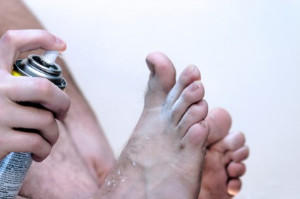 A common fungal infection that affects many people worldwide is athlete’s foot. It can cause the skin between the toes and on the bottom of the foot to become red, inflamed, and uncomfortable. Additional symptoms can include cracked and flakey skin, and in severe cases, blisters may develop. It is considered to be contagious, and lives in areas that may include public swimming pools, locker rooms, and surrounding areas. An effective prevention technique can consist of wearing appropriate shoes while in these types of environments. Research has indicated it is beneficial to refrain from sharing towels, socks, and shoes in order to help to limit the spread of athlete’s foot. It is helpful to wash clothes that have been worn, bath mats, and sheets, as this is instrumental in preventing the spread of athlete’s foot. If you believe you are afflicted with this condition, it is strongly suggested that you are under the care of a podiatrist who can help you properly manage your athlete’s foot.
A common fungal infection that affects many people worldwide is athlete’s foot. It can cause the skin between the toes and on the bottom of the foot to become red, inflamed, and uncomfortable. Additional symptoms can include cracked and flakey skin, and in severe cases, blisters may develop. It is considered to be contagious, and lives in areas that may include public swimming pools, locker rooms, and surrounding areas. An effective prevention technique can consist of wearing appropriate shoes while in these types of environments. Research has indicated it is beneficial to refrain from sharing towels, socks, and shoes in order to help to limit the spread of athlete’s foot. It is helpful to wash clothes that have been worn, bath mats, and sheets, as this is instrumental in preventing the spread of athlete’s foot. If you believe you are afflicted with this condition, it is strongly suggested that you are under the care of a podiatrist who can help you properly manage your athlete’s foot.
Athlete’s Foot
Athlete’s foot is often an uncomfortable condition to experience. Thankfully, podiatrists specialize in treating athlete’s foot and offer the best treatment options. If you have any questions about athlete’s foot, consult with Dr. Steven Schwartz from Pennsylvania. Our doctor will assess your condition and provide you with quality treatment.
What Is Athlete’s Foot?
Tinea pedis, more commonly known as athlete’s foot, is a non-serious and common fungal infection of the foot. Athlete’s foot is contagious and can be contracted by touching someone who has it or infected surfaces. The most common places contaminated by it are public showers, locker rooms, and swimming pools. Once contracted, it grows on feet that are left inside moist, dark, and warm shoes and socks.
Prevention
The most effective ways to prevent athlete’s foot include:
- Thoroughly washing and drying feet
- Avoid going barefoot in locker rooms and public showers
- Using shower shoes in public showers
- Wearing socks that allow the feet to breathe
- Changing socks and shoes frequently if you sweat a lot
Symptoms
Athlete’s foot initially occurs as a rash between the toes. However, if left undiagnosed, it can spread to the sides and bottom of the feet, toenails, and if touched by hand, the hands themselves. Symptoms include:
- Redness
- Burning
- Itching
- Scaly and peeling skin
Diagnosis and Treatment
Diagnosis is quick and easy. Skin samples will be taken and either viewed under a microscope or sent to a lab for testing. Sometimes, a podiatrist can diagnose it based on simply looking at it. Once confirmed, treatment options include oral and topical antifungal medications.
If you have any questions, please feel free to contact our offices located in Chambersburg, and Mcconnellsburg, PA . We offer the newest diagnostic and treatment technologies for all your foot care needs.
Why Is Screening for Peripheral Artery Disease Important?
 Peripheral artery disease (PAD) is a condition in which blood flow to the lower limbs is inadequate, usually as a result of the arteries narrowing or hardening because of plaque buildup. In its early stages, PAD is often asymptomatic. As it progresses, patients may notice muscle aches and cramps in the lower limbs, difficulty walking, burning or tingling pain, skin discoloration, coolness, or hair loss, and poorly healing wounds developing on the feet or ankles. Left undetected and untreated, PAD can progressively worsen and increase one’s risk of having a cardiovascular event such as a heart attack or stroke. Screening for PAD can be done by your podiatrist to detect and treat PAD early. Vascular testing by your podiatrist is generally safe, painless, and non-invasive. Most podiatrists use the Ankle-Brachial Index test which involves measuring the blood pressure at your arms and ankles and comparing the two numbers, and Doppler ultrasounds to screen for PAD. To learn more and schedule a screening, speak with a podiatrist near you.
Peripheral artery disease (PAD) is a condition in which blood flow to the lower limbs is inadequate, usually as a result of the arteries narrowing or hardening because of plaque buildup. In its early stages, PAD is often asymptomatic. As it progresses, patients may notice muscle aches and cramps in the lower limbs, difficulty walking, burning or tingling pain, skin discoloration, coolness, or hair loss, and poorly healing wounds developing on the feet or ankles. Left undetected and untreated, PAD can progressively worsen and increase one’s risk of having a cardiovascular event such as a heart attack or stroke. Screening for PAD can be done by your podiatrist to detect and treat PAD early. Vascular testing by your podiatrist is generally safe, painless, and non-invasive. Most podiatrists use the Ankle-Brachial Index test which involves measuring the blood pressure at your arms and ankles and comparing the two numbers, and Doppler ultrasounds to screen for PAD. To learn more and schedule a screening, speak with a podiatrist near you.
Vascular testing plays an important part in diagnosing disease like peripheral artery disease. If you have symptoms of peripheral artery disease, or diabetes, consult with Dr. Steven Schwartz from Pennsylvania. Our doctor will assess your condition and provide you with quality foot and ankle treatment.
What Is Vascular Testing?
Vascular testing checks for how well blood circulation is in the veins and arteries. This is most often done to determine and treat a patient for peripheral artery disease (PAD), stroke, and aneurysms. Podiatrists utilize vascular testing when a patient has symptoms of PAD or if they believe they might. If a patient has diabetes, a podiatrist may determine a vascular test to be prudent to check for poor blood circulation.
How Is it Conducted?
Most forms of vascular testing are non-invasive. Podiatrists will first conduct a visual inspection for any wounds, discoloration, and any abnormal signs prior to a vascular test.
The most common tests include:
- Ankle-Brachial Index (ABI) examination
- Doppler examination
- Pedal pulses
These tests are safe, painless, and easy to do. Once finished, the podiatrist can then provide a diagnosis and the best course for treatment.
If you have any questions, please feel free to contact our offices located in Chambersburg, and Mcconnellsburg, PA . We offer the newest diagnostic and treatment technologies for all your foot care needs.

